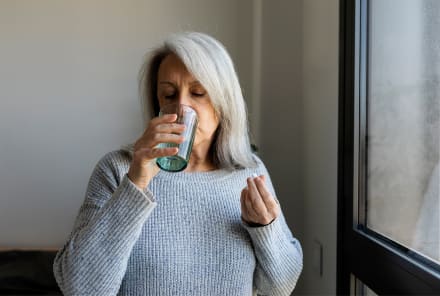Advertisement
Over 40 & Tired? Here's How This Dietitian Recommends Staying Energized All Day


As I've entered my 40s, I've certainly noticed that my energy levels aren't what they used to be. Mornings that once started with a spring in my step now seem to require a little more coaxing. It's as if my body has decided that it prefers a slower pace, and while I can't blame it, I sometimes find myself wishing for the boundless energy I had in my younger days.
While I wish I could find an hour every day to take a midday snooze, between needing to keep up with my daughter's bustling calendar, my business obligations, and my attempts at maintaining a semblance of a social life (while still maintaining my marriage!), there simply aren't enough hours in the day.
Many of my friends live off caffeine to help themselves push through the day. But thanks to the knowledge about caffeine I have gleaned from being a dietitian for over 22 years, I can't convince myself that guzzling down copious amounts of energy drinks and espresso shots is the best approach to maintaining my energy levels and my overall health. While some caffeine is unlikely to cause harm, too much of the stimulant can lead to feelings of anxiety, difficulty sleeping, and other effects that I simply don't have the capacity to deal with.
The good news is that consuming caffeine isn't the only way to feel more pep in your step! There are so many natural approaches to boost your energy that don't involve that afternoon quadruple-shot latte. As I have gracefully glided into what some affectionately refer to as middle age, I have discovered a few habits that have truly made a difference for me.
And of course, I have been evaluated by my health care provider to ensure there are no existing health conditions that are causing me to feel less energized—feeling less energized is simply a natural part of the aging process for many people.
I focus on my iron intake
I have always struggled with having low iron status, a condition that can lead to many unsavory symptoms, including feeling tired all the time.
Having low iron levels can lead to fatigue because iron is essential for producing hemoglobin, the protein in red blood cells that carries oxygen throughout your body to your tissues and organs. When your tissues and organs don't get enough oxygen, it can leave you feeling sluggish and worn out.
Because of my history, whenever I go to my doctor I get my iron levels checked. I know why I would usually trend low—I used to be "good" for a few weeks by eating lean beef regularly, taking an iron supplement with OJ (the vitamin C helps support absorption), and even cooking with a cast iron pan to help support healthy iron status! Then, slowly but surely, I would inevitably fall off the iron-consuming wagon and get back to square one.
Now that I am in my 40s, I'm committed to keeping my iron stores healthy. Habits like enjoying grilled lean steak on my salads, limiting coffee or tea when enjoying plant-based iron sources (a compound in these beverages can impact absorption), and taking my iron bisglycinate supplement regularly have kept my doctor very happy when she checks my status these days. And I feel better too!
I start my day with sun
I have a habit of drinking my single morning cup of coffee away from my phone or TV and instead enjoying it on my outdoor porch. When I am away from home and I don't have access to a porch, I still find a way to drink it outside.
Drinking coffee outside in the morning allows me to soak up vital sunlight, which plays a role in regulating my circadian rhythm1. Natural light exposure first thing in the day helps signal to my body that it's time to wake up, increasing alertness and energy levels.
Sunlight may trigger the production of serotonin2, a neurotransmitter that contributes to feelings of well-being and happiness, effectively setting a positive tone for the rest of the day. In contrast, starting the day without sunlight tends to leave me feeling groggy and disoriented—not great for productivity or positivity.
During the winter months, when sunlight is scarce, I rely on a SAD (seasonal affective disorder) lamp as a substitute to combat the effects of reduced natural light. These lamps mimic the intensity of sunlight, helping to stimulate serotonin production and alleviate symptoms of seasonal depression.
Missing out on this natural light exposure may disrupt mental clarity and may even be linked to elevated cortisol3, which can lead to feelings of stress, making it all the more crucial to find alternatives during the darker months. Integrating sunlight into my morning routine has become essential for maintaining not only my energy levels but also my overall mental well-being.
I schedule snack time
I've implemented a little ritual that brings me back to my elementary school days: scheduled snack time. This isn't just an arbitrary indulgence; I literally note it on my calendar, giving myself permission to pause and refuel.
Reflecting on my past experiences, I realized that many of those sluggish moments were often just signs that my body needed a snack—it was as simple as that! I'd find myself battling fatigue, struggling to concentrate, or staring blankly at my work, completely unaware that the answer was simply to nourish myself.
Now, with my structured snack time, I can ward off those lethargic episodes and maintain my energy throughout the day, allowing me to stay productive and engaged.
I go with green tea after one cup of joe
I drink green tea instead of coffee after lunch because the caffeine works a little differently and helps energize without the crash. Green tea contains a moderate amount of caffeine, but it also has an amino acid called L-theanine. This combination provides a more stable energy boost, enhancing alertness while promoting relaxation simultaneously.
Additionally, green tea offers antioxidant effects like catechins, which help protect the body from oxidative stress. These compounds work together to provide a calmer, sustained energy, helping to avoid the jitters and the subsequent crashes that can come from coffee.
I engage in short bursts of exercise
In all honesty, incorporating short bursts of exercise into the workday sometimes feels like an annoying task. But when I feel my energy fading, before doing anything else, I get my body moving.
These brief periods of physical activity help to increase blood flow and oxygen to the brain, which at least for me, enhances mental clarity and focus. Additionally, movement triggers the release of endorphins, which are natural mood lifters that can reduce stress and rejuvenate the mind. I also don't mind breaking up the monotony of the day…I will admit that my day can feel boring at times.
When the weather is nice, I go for a 10-minute walk wearing my Bala bangles on my wrists. I don't listen to any podcasts or music when I walk, instead allowing my brain to have a break from stimulation (some now call it "silent walking." But I just call it walking).
When I can't go outside, I will stream a 10-minute workout or I will turn on some of my beloved '90s jams and dance it out a la Meredith Grey in her early hospital days.
I drink pomegranate juice instead of wine
While I am not against including small amounts of alcohol in an overall healthy lifestyle, I try to avoid making drinking alcohol a habit. Alcohol is a depressant that can disrupt sleep patterns, which can affect my body's ability to get restorative sleep, even if I manage to get a full night's rest. And too much booze the night before can leave even the healthiest person feeling groggy and sluggish the next day—just not worth it for me.
Sometimes, I will pour pomegranate juice into my fancy wineglass in place of red wine for the same vibe as sipping on a rich merlot but without the alcohol. And fun fact: An in vitro study at UCLA4 found that on average, pomegranate juice has more antioxidant potency than red wine, Concord grape juice, or green tea. Plus, there are 700 mg of polyphenol antioxidants in every 8 ounces of pomegranate juice (just make sure you're buying 100% pomegranate juice).
I drink fluids all day long
Keeping a giant container of water on hand at all times is nothing new, as evidenced by the popularity of our beloved Stanley cups. But for some folks (like me), just having a bottle of water as a visual cue isn't enough to make me actually drink, even though I know that staying hydrated is a highly effective step in maintaining energy levels naturally.
Water may not be top-of-mind when it comes to energizing drinks, but it should be! Water is essential for nearly every bodily function, including cellular processes and nutrient transportation. When the body is adequately hydrated, it operates more efficiently, reducing the strain on the heart to pump blood and ensuring that muscles work effectively. Dehydration, even in its mildest form, may lead to fatigue5.
I know there are many apps available that track water intake or alert you when it has been too many minutes since you last took a sip. But middle age brings about not only not only less energy but also less patience to learn the ins and outs of new apps. Instead, I set an alarm on my phone that goes off every hour. If I haven't drunk enough by the time my alarm goes off, I sip away. When I stay hydrated, I find my energy levels are so much more robust than the dehydrated version of myself.
The takeaway
Age will constantly throw new things our way as our bodies continue to change, but there are plenty of things we can do to adapt and continue to feel our best. For me, iron, sunshine, snacks, movement, and hydration have all been essential in optimizing my health past 40, which I've learned through experimenting. Try a few of these tips, listen to your body, and create your own energy-supporting lifestyle list.
Watch Next
Enjoy some of our favorite clips from classes
Enjoy some of our favorite clips from classes
What Is Meditation?
Mindfulness/Spirituality | Light Watkins
Box Breathing
Mindfulness/Spirituality | Gwen Dittmar
What Breathwork Can Address
Mindfulness/Spirituality | Gwen Dittmar
The 8 Limbs of Yoga - What is Asana?
Yoga | Caley Alyssa
Two Standing Postures to Open Up Tight Hips
Yoga | Caley Alyssa
How Plants Can Optimize Athletic Performance
Nutrition | Rich Roll
What to Eat Before a Workout
Nutrition | Rich Roll
How Ayurveda Helps Us Navigate Modern Life
Nutrition | Sahara Rose
Messages About Love & Relationships
Love & Relationships | Esther Perel
Love Languages
Love & Relationships | Esther Perel
What Is Meditation?
Box Breathing
What Breathwork Can Address
The 8 Limbs of Yoga - What is Asana?
Two Standing Postures to Open Up Tight Hips
How Plants Can Optimize Athletic Performance
What to Eat Before a Workout
How Ayurveda Helps Us Navigate Modern Life
Messages About Love & Relationships
Love Languages
Advertisement

This Supplement May Remarkably Benefit Those With A High Risk Of Alzheimer’s
Molly Knudsen, M.S., RDN

Want To Be Metabolically Healthy? Study Shows An Underutilized Approach
Molly Knudsen, M.S., RDN

Don’t Eat A Lot Of Meat? Make Sure You Take This Supplement Daily
Molly Knudsen, M.S., RDN

Study Reveals 2 Habits That Are Early Signs Of Muscle Loss In Women
Molly Knudsen, M.S., RDN

This Supplement May Remarkably Benefit Those With A High Risk Of Alzheimer’s
Molly Knudsen, M.S., RDN

Want To Be Metabolically Healthy? Study Shows An Underutilized Approach
Molly Knudsen, M.S., RDN

Don’t Eat A Lot Of Meat? Make Sure You Take This Supplement Daily
Molly Knudsen, M.S., RDN

Study Reveals 2 Habits That Are Early Signs Of Muscle Loss In Women
Molly Knudsen, M.S., RDN

This Supplement May Remarkably Benefit Those With A High Risk Of Alzheimer’s
Molly Knudsen, M.S., RDN

Want To Be Metabolically Healthy? Study Shows An Underutilized Approach
Molly Knudsen, M.S., RDN

Don’t Eat A Lot Of Meat? Make Sure You Take This Supplement Daily
Molly Knudsen, M.S., RDN

Study Reveals 2 Habits That Are Early Signs Of Muscle Loss In Women
Molly Knudsen, M.S., RDN

This Supplement May Remarkably Benefit Those With A High Risk Of Alzheimer’s
Molly Knudsen, M.S., RDN

Want To Be Metabolically Healthy? Study Shows An Underutilized Approach
Molly Knudsen, M.S., RDN

Don’t Eat A Lot Of Meat? Make Sure You Take This Supplement Daily
Molly Knudsen, M.S., RDN

Study Reveals 2 Habits That Are Early Signs Of Muscle Loss In Women
Molly Knudsen, M.S., RDN










